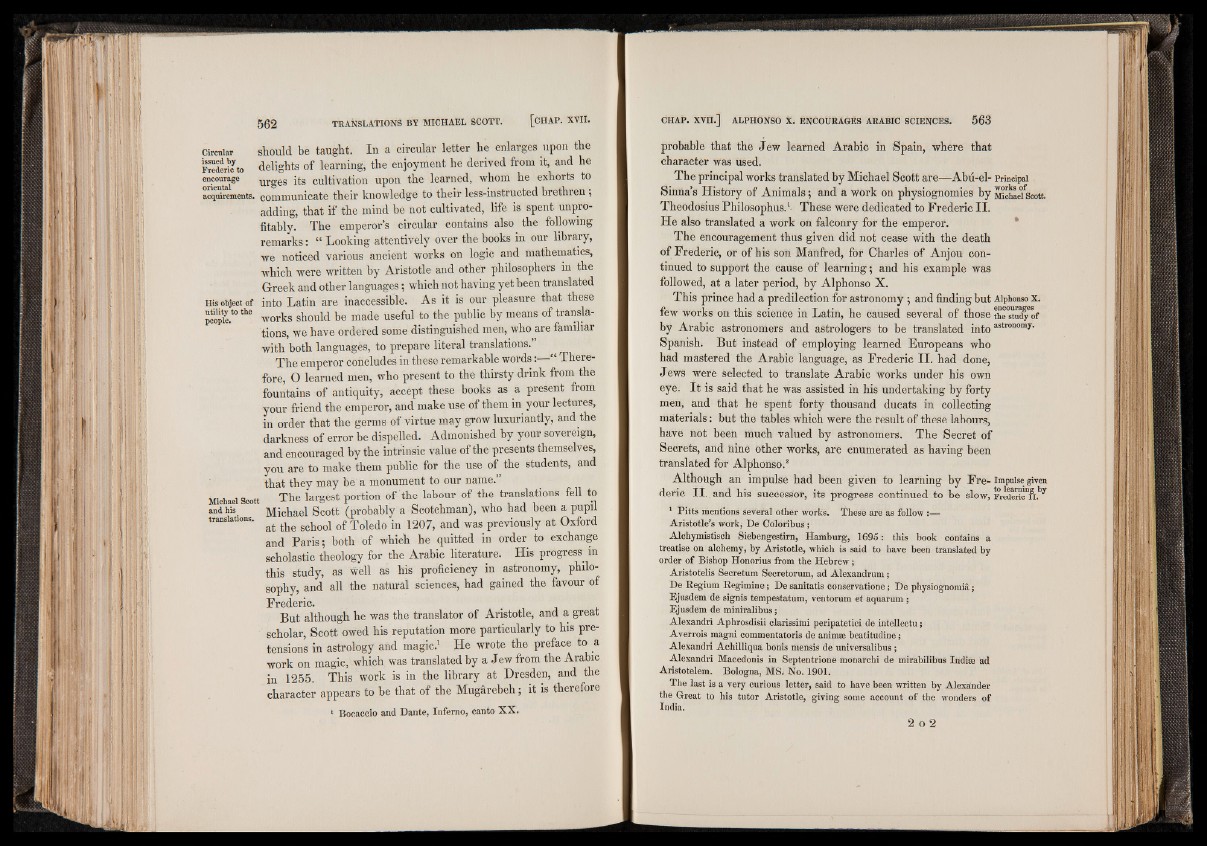
Circular should be taught. In a circular letter he enlarges upon the
S r iJ to delights of learning, the enjoyment he derived from it, and he
encourage urges its cultivation upon the learned, whom he exhorts to
acquirements, communicate their knowledge to their less-instructed brethren,
adding, that if the mind be not cultivated, life is spent unpro-
fitably. The emperor’s circular contains also the following
remarks : if Looking attentively over the books in our library,
we noticed various ancient works on logic and mathematics,
which were written by Aristotle and other philosophers in the
Greek and other languages ; which not having yet been translated
ms object of into Latin are inaccessible. As it is our pleasure that these
people.*0 works should be made useful to the public by means of translations,
we have ordered some distinguished men, who are familiar
with both languages, to prepare literal translations.
The emperor concludes in these remarkable words : Therefore,
O learned men, who present to the thirsty drink from the
fountains of antiquity, accept these books as a present from
your friend the emperor, and make use of them in your lectures,
in order that the germs of virtue may grow luxuriantly, and the
darkness of error be dispelled. Admonished by your sovereign,
and encouraged by the intrinsic value of the presents themselves,
you are to make them public for the use of the students, and
that they may be a monument to our name.”
Micbaei Scott The largest portion of the labour of the translations fell to
and his Michael Scott (probably a Scotchman), who had been a pupd
translations, g ^ gcl)0ol of Toiedo in 1207, and was previously at Oxford
and Paris ; both of which he quitted in order to exchange
scholastic theology for the Arabic literature. His progress in
this study, as well as his proficiency in astronomy, philosophy,
and all the natural sciences, had gained the favour of
Frederic.
But although he was the translator of Aristotle, and a great
scholar, Scott owed his reputation more particularly to his pretensions
in astrology and magic.1 He wrote the preface to a
work on magic, which was translated by a Jew from the Arabic
in 1255. This work is in the library at Dresden, and the
character appears to be that of the Mugârebeh; it is therefore
1 Bocaccio and Dante, Inferno, canto X X .
probable that the Jew learned Arabic in Spain, where that
character was used.
The principal works translated by Michael Scott are—Abu-el- Principal
Sinna’s History of Animals; and a work on physiognomies by Michael Scott.
Theodosius Philosophus.1- These were dedicated to Frederic II.
He also translated a work on falconry for the emperor.
The encouragement thus given did not cease with the death
of Frederic, or of his son Manfred, for Charles of Anjou continued
to support the cause of learning; and his example was
followed, at a later period, by Alphonso X.
This prince had a predilection for astronomy; and finding but Alphonso x.
few works on this science in Latin, he caused several of those thfstudyof
by Arabic astronomers and astrologers to be translated into astronomy‘
Spanish. But instead of employing learned Europeans who
had mastered the Arabic language, as Frederic II. had done,
Jews were selected to translate Arabic works under his own
eye. It is said that he was assisted in his undertaking by forty
men, and that he spent forty thousand ducats in collecting
materials: but the tables which were the result of these labours,
have not been much valued by astronomers. The Secret of
Secrets, and nine other works, are enumerated as having been
translated for Alphonso.2
Although an impulse had been given to learning by Fre- impulse given
deric II. and his successor, its progress continued to be slow, FredericH.by
1 P itts mentions several other works. These are as follow :—
Aristotle’s work, De Coloribus;
Alchymistisch Siebengestirn, Hamburg, 1695: this book contains a
treatise on alchemy, by Aristotle, which is said to have been translated by
order of Bishop Honorius from the Hebrew;
Aristotelis Secretum Secretorum, ad Alexandrum;
De Begium Begimine; De sanitatis Conservatione; De physiognomic;
Ejusdem de signis tempestatum, ventorum et aquarum ;
Ejusdem de miniralibus;
Alexandri Aphrosdisii clarissimi peripatetici de intellectu;
Averrois magni commentatoris de animse beatitudine;
Alexandri Achilliqua bonis mensis de universalibus ;
Alexandri Macedonia in Septentrione monarchi de mirabilibus Indise ad
Aristotelem. Bologna, MS. Ho. 1901.
The last is a very curious letter, said to have been written by Alexander
the Great to his tutor Aristotle, giving some account of the wonders of
India.
2 O 2